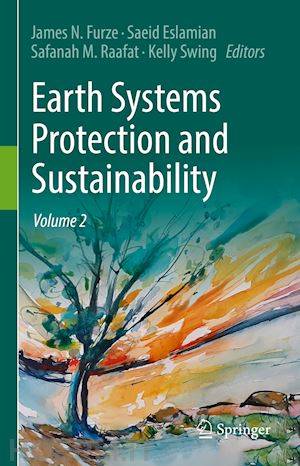
Questo prodotto usufruisce delle SPEDIZIONI GRATIS
selezionando l'opzione Corriere Veloce in fase di ordine.
Pagabile anche con Carta della cultura giovani e del merito, 18App Bonus Cultura e Carta del Docente
Earth Systems Protection and Sustainability authorises imperatives to achieve sustainability and protect our threatened and vulnerable Earth. Mathematical advances in context incorporate operational and Boolean, as well as linguistic, logic-based Bayesian, and generative methods for scenario formation. Functional areas and deeper learning enable the use of searching algorithms, proffering optimal solutions for the circular nature of sustainability in natural ecosystems and human dominated settings. Key informative nodes are provided in the hope that we may moderate the very real dangers facing planet Earth and its biodiversity. An arena of insightful chapters is blended with social resilience and socio-economic development coverage, accentuating integrity, protection and sustainability within divergent climatic forces and species dynamics on Earth.
Volume 2 focuses on bioaccumulation; climate change and resiliencefor co-operative socio-economic and ecosystem management via policy frameworks across sectors; mathematical modelling of freshwater in coastal regions in arid and semi-arid zones; decision making in natural disasters; peat solidification for environmentally sustainable geotechnical engineering; green energy conversion; flood risk mapping; rainfall analysis; exposure, safety, and security amidst increasing environmental contamination; remote handling vehicles; wind turbines; and deep learning and its environmental applications. Earth Systems Protection and Sustainability is addressed globally to communities, schools and researchers in professional, governmental and unit operations; descriptive and illustrative sections include all sectors to ensure Earth Systems Protection as our capacity reaches an unsustainable climax.
Dr. James Nicholas Furze is a member and Fellow of the Laboratory of Biotechnology and Valorization of Natural Resources, Ibn Zohr University, Morocco; Control and Systems Engineering Department of the University of Technology-Iraq, Baghdad, Iraq; and an elected Fellow of the Royal Geographical Society (with the Institute of British Geographers), London, England.
Dr. Saeid Eslamian is a Professor of Hydrology and Water Resources Sustainability in the Department of Water Engineering, and Director of the Centre of Excellence of Risk Analysis and Natural Hazards at Isfahan University of Technology, Iran.
Dr. Safanah Mudheher Raafat is a Professor in the Control and Systems Engineering Department at the University of Technology-Iraq, Baghdad, Iraq.
Dr. Kelly Swing is a Professorof Tropical Ecology and Environmental Science at the University of San Francisco de Quito and Director Emeritus of the Tiputini Biodiversity Station, Quito, Ecuador.











Il sito utilizza cookie ed altri strumenti di tracciamento che raccolgono informazioni dal dispositivo dell’utente. Oltre ai cookie tecnici ed analitici aggregati, strettamente necessari per il funzionamento di questo sito web, previo consenso dell’utente possono essere installati cookie di profilazione e marketing e cookie dei social media. Cliccando su “Accetto tutti i cookie” saranno attivate tutte le categorie di cookie. Per accettare solo deterninate categorie di cookie, cliccare invece su “Impostazioni cookie”. Chiudendo il banner o continuando a navigare saranno installati solo cookie tecnici. Per maggiori dettagli, consultare la Cookie Policy.